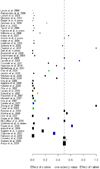The serotonin transporter promoter variant (5-HTTLPR), stress, and depression meta-analysis revisited: evidence of genetic moderation
- PMID: 21199959
- PMCID: PMC3740203
- DOI: 10.1001/archgenpsychiatry.2010.189
The serotonin transporter promoter variant (5-HTTLPR), stress, and depression meta-analysis revisited: evidence of genetic moderation
Abstract
Context: Two recent meta-analyses assessed the set of studies exploring the interaction between a serotonin transporter promoter polymorphism (5-HTTLPR) and stress in the development of depression and concluded that the evidence did not support the presence of the interaction. However, even the larger of the meta-analyses included only 14 of the 56 studies that have assessed the relationship between 5-HTTLPR, stress, and depression.
Objective: To perform a meta-analysis including all relevant studies exploring the interaction.
Data sources: We identified studies published through November 2009 in PubMed.
Study selection: We excluded 2 studies presenting data that were included in other larger studies.
Data extraction: To perform a more inclusive meta-analysis, we used the Liptak-Stouffer z score method to combine findings of primary studies at the level of significance tests rather than the level of raw data.
Data synthesis: We included 54 studies and found strong evidence that 5-HTTLPR moderates the relationship between stress and depression, with the 5-HTTLPR s allele associated with an increased risk of developing depression under stress (P = .00002). When stratifying our analysis by the type of stressor studied, we found strong evidence for an association between the s allele and increased stress sensitivity in the childhood maltreatment (P = .00007) and the specific medical condition (P = .0004) groups of studies but only marginal evidence for an association in the stressful life events group (P = .03). When restricting our analysis to the studies included in the previous meta-analyses, we found no evidence of association (Munafò et al studies, P = .16; Risch et al studies, P = .11). This suggests that the difference in results between meta-analyses was due to the different set of included studies rather than the meta-analytic technique.
Conclusion: Contrary to the results of the smaller earlier meta-analyses, we find strong evidence that the studies published to date support the hypothesis that 5-HTTLPR moderates the relationship between stress and depression.
Figures

Comment in
-
Genes and environment in psychiatry: winner's curse or cure?Arch Gen Psychiatry. 2011 May;68(5):455-6. doi: 10.1001/archgenpsychiatry.2011.35. Arch Gen Psychiatry. 2011. PMID: 21536973 No abstract available.
-
Genetic indeterminism, the 5-HTTLPR, and the paths forward in neuropsychiatric genetics.Arch Gen Psychiatry. 2011 May;68(5):457-8. doi: 10.1001/archgenpsychiatry.2011.34. Arch Gen Psychiatry. 2011. PMID: 21536974 Free PMC article. No abstract available.
-
The Liptak-Stouffer test for meta-analyses.Biol Psychiatry. 2015 Jan 1;77(1):e1-2. doi: 10.1016/j.biopsych.2013.11.033. Epub 2014 Feb 21. Biol Psychiatry. 2015. PMID: 24655596 No abstract available.
-
Reply to: the liptak-stouffer test for meta-analyses.Biol Psychiatry. 2015 Jan 1;77(1):e3-4. doi: 10.1016/j.biopsych.2014.02.009. Epub 2014 Feb 21. Biol Psychiatry. 2015. PMID: 24655597 Free PMC article. No abstract available.
References
-
- Caspi A, Sugden K, Moffitt TE, et al. Influence of life stress on depression: moderation by a polymorphism in the 5-HTT gene. Science. 2003 Jul 18;301(5631):386–389. - PubMed
-
- Holden C. Behavioral genetics. Getting the short end of the allele. Science. 2003 Jul 18;301(5631):291–293. - PubMed
-
- Munafo MR, Durrant C, Lewis G, Flint J. Gene x Environment Interactions at the Serotonin Transporter Locus. Biol Psychiatry. Aug 6;:2008. - PubMed
-
- Lotrich FE, Lenze E. Gene-environment interactions and depression. JAMA. 2009 Nov 4;302(17):1859–1860. author reply 1861–1852. - PubMed
Publication types
MeSH terms
Substances
Grants and funding
LinkOut - more resources
Full Text Sources
Other Literature Sources
Medical

